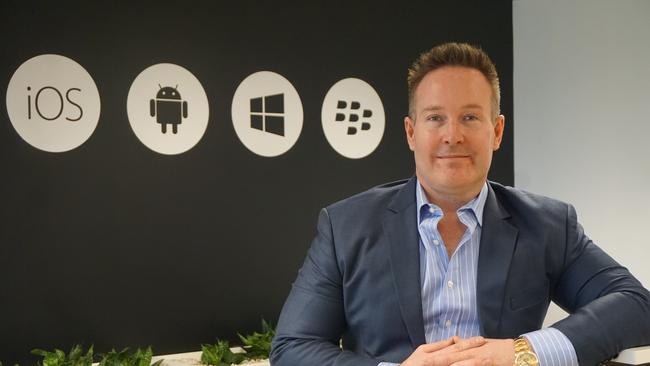BlackBerry targets Australian business
The cause for optimism has been revenue growth from software.

Buoyed by a promising quarterly result, BlackBerry is targeting local enterprise with its souped-up server and new Android phone.
With 5 acquisitions and Priv, its first Android phone in market, the buzz word around the Canadian firm is “consolidation”.
“We’ve certainly been on an acquisition spree in the last 12-18 months,” said BlackBerry Australian managing director Matthew Ball. “The job we have to do in the next 12-18 months is continuing the consolidation of those acquisitions.”
Go back to Q4, 2009 and BlackBerry enjoyed a 19.9 per cent share of the global smartphone market. With the iPhone eventually taking hold and BlackBerry encountering serious technical glitches with competing handsets, this marketshare nosedived to 2.9 per cent by Q1, 2013.
So in November that year, BlackBerry set course away from being predominantly a handset maker. Handset sales have dropped to a paltry 0.3 per cent since.
While hardware profitability continues to plummet, the cause for optimism has been revenue growth from software. In December BlackBerry reported its first total revenue increase in 9 quarters. Overall it still made a loss but it was much less than general expectations.
The company has worked to make its security features available cross-platform with software offerings for iOS, Android and Windows mobile devices. It also upgraded its BlackBerry Enterprise Server — BES12.
Currently, upgrades involve integrating features from its recent acquisitions: Secusmart and Movirtu in 2014, and file security firm WatchDox, crisis communications provider AtHoc and security rival Good Technology last year.
Last week BlackBerry rolled out its new WatchDox product as part of BES. It wraps a layer of security around each enterprise file and limits how it is accessed.
Companies can nominate who accesses or prints any document, and limit editing and copying and pasting. Documents can be rendered unreadable after a set date, or if opened at unauthorised locations. Access can be revoked at any time.
BlackBerry also is integrating security features from Good Technology. The deal to buy the company was completed just a month ago.
The Good Technology software lets an IT department manage a separate secure container on employees’ devices. Companies can push secure apps to that container and employees can access a secure browser, intranet pages and collaboration tools such as Microsoft SharePoint.
Technical solutions manager Adam Sloan said WatchDox could now run inside a Good Technology container. A container suite was “an area where BlackBerry was probably lacking in the past,” Mr Sloan said.
BlackBerry meanwhile is talking up the first Android phone it has brought to market, Priv, and its security features.
While embracing Android seems a logical step, it has its risks for BlackBerry whose branding is bulletproof security.
Android traditionally has been plagued by security holes, so BlackBerry has added features to head-off concerns.
They include the app Dtek, which offers advanced privacy controls. It will notify a user immediately any app uses the microphone, camera, location and personal information and where the access happened. You set up the notifications you wish to get. Handset owners also can use Dtek to tweak app privacy settings.
There’s BlackBerry Hub, a one-stop-shop for emails and text message from various sources, Calendar, and the ubiquitous BlackBerry Messenger. The biggest departure from traditional Android phones is the signature BlackBerry slidable keyboard.
Priv currently runs an older version of Android, Lollipop 5.1.1, but BlackBerry is promising an eventual upgrade to Marshmallow. It was launched in Australia on February 3 and is sold through Optus.
But Mr Ball said he believed the overwhelming majority of Priv handsets would be sold directly to companies who would offer them to staff.
“That is certainly our expectation and forecast at the moment. But we’re starting to see some very early velocity in consumer,” Mr Ball said. He said Optus had doubled its projection of sales of Priv to consumers since launch.
The challenge now is to increase that quarterly software revenue figure. If BlackBerry succeeds, it has a more modest but stable future in the enterprise server and software market. It has been implementing layers of security from its acquisitions and has integrated third party security solutions such as Samsung Knox.
But in the enterprise business, it’s up against a battery of seasoned competition, including Microsoft and Google. It has to show that its own solution bolstered by its acquisitions is a better alternative and worth the money.
More: BlackBerry catches up with Android with new smartphone named Priv.


